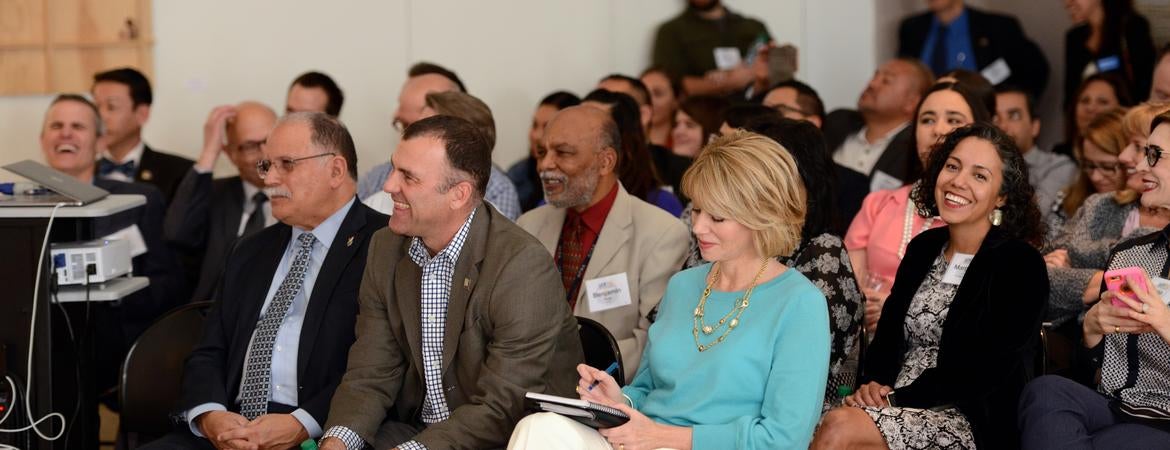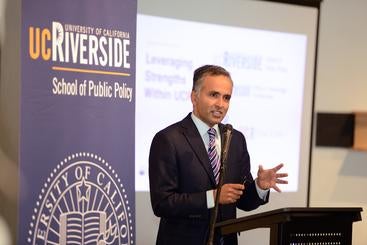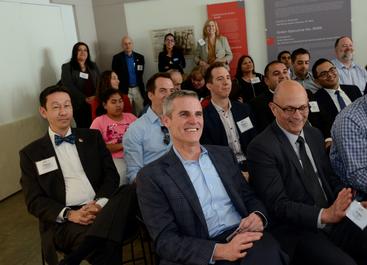
A new research center at the University of California, Riverside, seeks to flip the script about Inland California’s reputation as an “area of need.”
Introduced during a launch event held Friday, Feb. 9, at the Riverside Art Museum, UCR’s Center for Social Innovation (CSI) instead aims to emphasize the Inland region’s potential as a hub of innovation.
“People think innovation in California happens only on the coast, from biotech in San Diego to high tech in Silicon Valley,” said CSI Founding Director Karthick Ramakrishnan. “By contrast, they think of Inland California primarily as an area of poverty and need, failing to recognize the important innovation happening in the region.”
With the goal of sparking renewed investment in the area, the center will bring together local researchers, various community and nonprofit organizations, and civic stakeholders looking to form long-term partnerships.
It embarks upon this mission with initial funding from the San Francisco-based James Irvine Foundation and the Weingart Foundation of Los Angeles. Funding from Miami’s Wallace H. Coulter Foundation also supports the center’s research and national outreach involving Asian Americans and Pacific Islanders.
Nearly 150 state and local leaders attended the center’s launch event, including James Irvine Foundation President and CEO Don Howard, Weingart Foundation President and CEO Fred Ali, Central Valley Community Foundation President and CEO Ashley Swearengin, Assemblyman Jose Medina, D-Riverside, and Riverside Mayor Rusty Bailey. UCR Chancellor Kim A. Wilcox addressed the crowd, detailing the university’s role in supporting Inland innovation at the community level.
“Innovation isn’t a thing that lives on a campus in Riverside,” Wilcox said, echoing the aim of the project and its focus on community collaboration and outreach. “Our commitment has never been about any one entity, but the collective.”
The result of two years of collaborative planning, the center comprises four UCR faculty-led research groups focused on key areas with policy implications for the Inland region:
- Cecilia Ayón, associate professor of public policy, will direct the Immigration Research Group.
- Francisco Pedraza, assistant professor of public policy and political science, and Loren Collingwood, assistant professor of political science, will co-direct the Civic Engagement Group.
- Ellen Reese, professor of sociology and chair of UCR’s labor studies program, will direct the Economic Mobility Group.
- Ramakrishnan, professor of public policy and political science who also serves as associate dean of the School of Public Policy, will direct the Leadership and Entrepreneurship Group.
The working groups, Ramakrishnan explained, will function as gateways to community engagement by spearheading research projects relevant to the Inland region, hosting signature events, and forging relationships with local leaders. The center also plans to launch new regional efforts, such as a nonprofit fellowship program, a nonprofit summer institute, and a social entrepreneurship incubator.
“By decentralizing our work and allowing each group to be agile and adaptive, we can better build bridges across the Inland region,” he said. “At our core, we believe we can advance research on critical issues facing this region while helping to build and grow local community organizations.”
More about the new Center for Social Innovation: UCR’s Center for Social Innovation aims to provide a credible research voice that spurs civic leadership and policy innovation. The center will be a breeding ground for collaborative projects that boost collective impact — all with the primary goal of shifting away from a “problem” narrative to an “opportunity” narrative for marginalized communities and localities.





